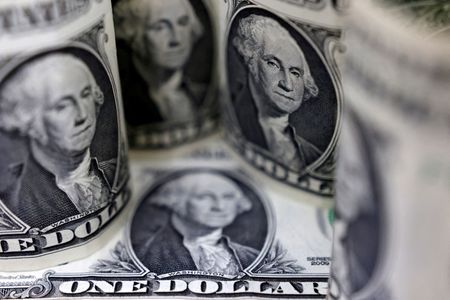By Gertrude Chavez-Dreyfuss
NEW YORK (Reuters) – The dollar was little changed to marginally higher on Wednesday as investors paused selling the greenback a day after Federal Reserve Chair Jerome Powell did not significantly change his interest rate outlook despite a strong U.S. jobs report last week.
The greenback’s outlook, however, remained tilted to the downside as the Fed nears the end of its tightening cycle and the markets price in rate cuts by the end of the year, analysts said.
In a question-and-answer session before the Economic Club of Washington on Tuesday, Powell said interest rates might need to move higher than expected if the U.S. economy remains strong, but reiterated he felt a process of “disinflation” is underway.
The greenback slipped as Powell spoke.
“The dollar weakened because Powell was not hawkish. There were a few nuggets in his speech that suggested that the jobs report has not materially shifted the Fed’s outlook,” said Thierry Wizman, global FX and rates strategist at Macquarie in New York. “Despite the data dependency of the outlook since last week, Powell did not even answer questions on whether or not he would have raised rates by more had he seen (the jobs report). Based on that demeanor, he would have not raised more and the outlook itself has not changed on one data point.”
New York Fed President John Williams on Wednesday added to Fed rhetoric of further pushing U.S. rates higher. He told a Wall Street Journal event that moving to a federal funds rate of between 5.00% and 5.25% “seems a very reasonable view of what we’ll need to do this year in order to get the supply and demand imbalances down.”
In afternoon trading, the euro was modestly lower at $1.0724 after falling to $1.067 the previous session, its lowest since Jan. 9. It remained far above September’s 20-year low of $0.953.
Investors also digested hawkish comments from two German officials at the European Central Bank (ECB).
“From where I stand today we need further, significant rate hikes,” German central bank chief Joachim Nagel told the newspaper Boersen-Zeitung on Tuesday.
His colleague Isabel Schnabel said it is not yet clear that the ECB rate hikes so far would bring inflation back to 2%.
Against a basket of currencies, the U.S. dollar index was narrowly up at 103.38, after slipping the previous session.
Sterling rose 0.2% to $1.207, recovering from Tuesday’s one-month trough of $1.196.
The greenback had a short-lived rally following Friday’s blockbuster jobs report, which showed that non-farm payrolls had surged by 517,000 jobs last month.
That sent the U.S. dollar index to a one-month high of 103.96 on Tuesday, as investors raised their expectations of how much further the Fed would need to keep raising interest rates.
Futures pricing on Wednesday showed that markets are expecting the Fed funds rate to peak just above 5.1% by July, from a range of 4.5% to 4.75% currently. But the market has priced in Fed cuts as well with the implied fed funds rate at 4.8% by the end of the year.
“As the market is pricing in a higher terminal rate, the market is also pricing in higher cuts of 25 or 50 basis points at the end of the year,” said Joe Perry, senior market analyst at FOREX.com and City Index in New York. “That’s negative for the dollar.”
Meanwhile, according to pricing in derivatives markets, traders expect the ECB to hike rates to rise to around 3.5% in late summer, from 2.5% now.
Elsewhere, the dollar rose 0.2% against the yen to 131.355 yen
Japanese real wages rose for the first time in nine months thanks to robust temporary bonuses, data on Tuesday showed.
The New Zealand dollar dipped 0.2% to US$0.6308. The Aussie dollar slipped 0.5% to US$0.6925 after surging more than 1% on Tuesday.
The Reserve Bank of Australia on Tuesday raised its cash rate by 25 basis points.
(This story has been refiled to correct the day to Wednesday in paragraph 6)
(Reporting by Gertrude Chavez-Dreyfuss; Additional reporting by Harry Robertson in London and Rae Wee in Singapore; Editing by Bradley Perrett, Christopher Cushing, Christina Fincher, Alexander Smith, Will Dunham and Jonathan Oatis)

